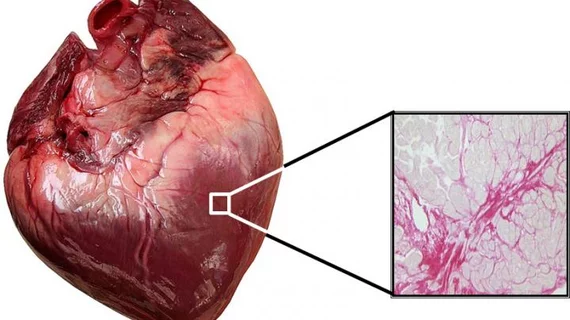Fluid redistribution study paves way for new heart failure treatments
Triggering a shift in fluids from the chest to the abdomen by blocking the splanchnic nerves has the potential to relieve acute heart failure symptoms, according to research presented May 26 at Heart Failure 2018 and published simultaneously in Circulation.
The first-in-human study of the technique included four men and one woman—average age 56—who were admitted to Duke University Medical Center with acute heart failure and New York Heart Association functional class III or IV. After blocking the splanchnic nerves with a lidocaine injection, the researchers noted right atrial pressures and pulmonary arterial pressures reduced rapidly before returning to baseline values around 90 minutes later after the lidocaine had worn off.
Mean arterial pressure dropped from 89 millimeters of mercury to 72 mm Hg at 30 minutes and mean right atrial pressure decreased from 21 mm Hg at baseline to 16 mm Hg at 90 minutes. Patients reported an acute improvement of symptoms immediately after the procedure and also traveled an average of 31.2 meters farther on a six-minute walk test. However, that distance didn’t reach statistical significance, partially due to low patient numbers.
“This study supports the notion that volume redistribution is a cause of heart failure,” principal investigator Marat Fudim, MD, said in a press release. “When the splanchnic nerve is blocked, the belly vasculature is no longer constricted and space is created. Fluid then shifts from the heart and lungs to the abdomen, where it should be. This normalizes pressures in the heart and lungs and patients feel better.”
Diuretics are commonly used to treat acute heart failure based on the idea that reducing fluids is necessary to relieve symptoms and improve heart function, but some of these patients suffer kidney damage. According to the press release, about half of patients with acute heart failure do not have fluid overload when they arrive to the hospital.
“Our study suggests that shifting fluid from the chest to the belly, instead of getting rid of fluid with diuretics, may be the appropriate treatment for some patients with acute heart failure,” Fudim said.
The authors said future studies should test whether longer-acting medications or killing the splanchnic nerves altogether are more effective treatments. In addition, the technique could be tested in chronic heart failure patients.
Major limitations of the study included its small sample size and lack of a control group.

